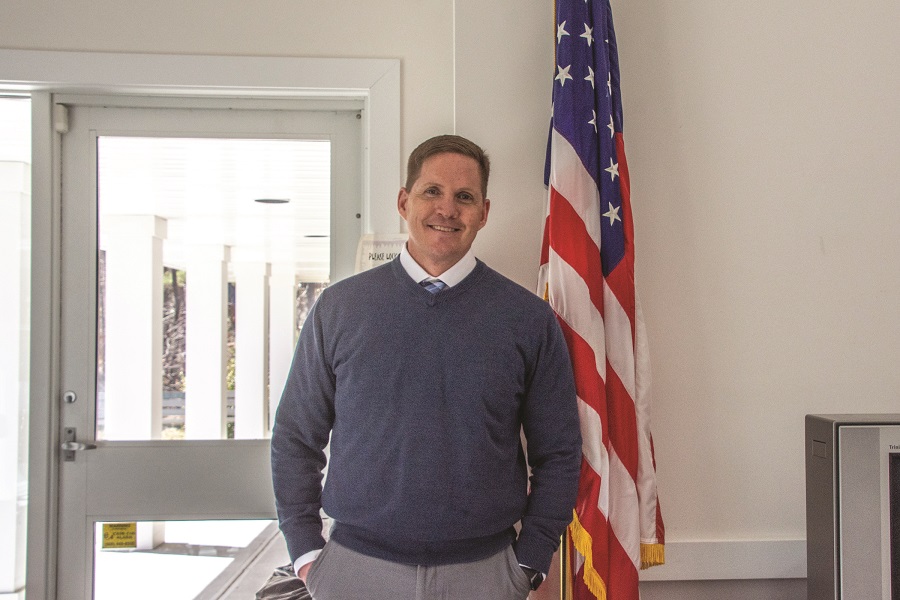WELLFLEET — The new town administrator won’t have a long commute. His town hall office is a short jaunt from his home.
Richard Waldo, Provincetown’s longtime public works director, was unanimously selected for the job by the select board on Tuesday, pending the successful negotiation of a contract. Closed door negotiations are set for March 29.
After being offered the position, Waldo texted the Independent, saying, “They made the right choice and won’t find a harder worker to serve in the position.” A start date has not yet been set, but Waldo is eager to begin.
“The top priority when I start is to work with the interim town administrator on transition planning and preparations for town meeting,” he said.

Select board member Helen Miranda Wilson initially said finalist Jayne Wellman, the Reading town business administrator, was her choice, but she added that she would fully support either of the two finalists. In a show of solidarity, she cast her vote for Waldo.
During an initial polling of the board members, chair Ryan Curley gave his reasons for favoring Waldo. “He’s led a large municipal staff, completed large municipal projects, and has strong ties to the area,” Curley said.
Board member John Wolf agreed. “He lives here, he’s raising his children here, he’s not going anywhere,” Wolf said. He noted that Waldo would soon complete a master’s degree in public administration, while Wellman was just starting a similar graduate program.
Board members Janet Reinhart and Michael DeVasto also favored Waldo over Wellman.
Three finalists had been selected by a screening committee, but Jason Silva, Marblehead’s former town administrator, dropped out to take a job with a private consulting firm, according to Richard White, the consultant overseeing the search process.
On Monday, the select board interviewed Waldo and Wellman, asking each the same 10 questions. Topics ranged from identifying the town’s short- and long-term challenges and listing ways they could be addressed, to the creation of more affordable housing, ways to streamline the town’s convoluted payroll system, and methods to communicate more effectively with Wellfleet’s 200 employees and the public.
The Public Works Director
Waldo has lived on the Outer Cape for 17 years. “I understand the people on the Outer Cape and I understand the workings of it and the challenges,” he said.
As Provincetown’s public works director for 10 years, Waldo oversaw eight departments and 40 full-time staff and handled a $12-million budget, according to his resume.
Waldo named regaining financial stability and restoring the public’s confidence as two immediate challenges that must be addressed. One way to get public support is by keeping people informed, he said.
While most towns post updates on their websites, Waldo said Provincetown’s is not generally used by residents, and the town added email blasts and a Facebook page to its outreach. “You have to hit them from every angle,” he said. Better public communication helps counter misinformation and “build morale and a more positive environment,” he said.
Midterm goals include finalizing the agreement for the 95 Lawrence Road affordable housing project.
“I think we need to take that next step forward to see that project come to fruition and support the residents of Wellfleet,” he said. Waldo also plans to start working with the state Dept. of Transportation on reconstructing the Main Street and Route 6 intersection, while keeping the public informed.
Long-term goals include protecting the town’s harbors and freshwater resources and managing waste, said Waldo.
“With good water quality, a good aquaculture industry, and good housing, I think we could set Wellfleet on a good trajectory for many years to come,” he said.
Asked about qualities that make him well-suited to the town administrator position, Waldo named his ability to deal effectively with both staff and the public. “I’m approachable; I’m able to be patient, reflect on a response, and build consensus,” he said. “I am goal-oriented; I want to inspire and attract staff who want to work in Wellfleet and to find their strong suits and encourage them to work hard. I’d like to build a positive atmosphere.”
When Wolf asked him how he would address an ongoing problem of staff accountability, Waldo said he would set goals and timelines and provide staff with the support they would need to succeed. “You can’t give them expectations without giving them the resources to meet those expectations,” he said.
Asked about disciplining those not meeting expectations, Waldo said there would be a progressive discipline procedure that employees and managers would be well aware of and that would be consistently applied. “Managers get in trouble when they show bias,” he said.
“It usually doesn’t take much after a verbal warning or a written warning for staff to correct,” he said. “Sometimes they just need to understand where they’re failing. You have to be a mentor to them, helping them get through those challenges instead of just reprimanding.”
The Business Manager
Wellman, who lives in Tewksbury, has served as Reading’s business manager for five years, analyzing budgets and working with the town’s finance director and treasurer, according to her resume. She identified short-term goals in Wellfleet of “getting hands around revenues, the budget, and managing that process.
“For me, one of them would be getting to know everybody in town, business owners, staff, and residents,” Wellman said. She said she would create an open-door policy for people to come and ask questions and start building transparency. “Restoring trust, I think, would be important short-term as well as long-term,” she said.

Her midterm goals included looking at infrastructure, department needs, and staff training, and addressing the need for additional staff. Wellman also said she would start work on the annual budget early and create an easy-to-follow, transparent process.
In the long term, she said she wants “to create a sustainable financial picture for the community that you could build on and not have to go for overrides for regular capital equipment and one-time monies for recurring operational costs.”
Asked about accountability of staff, Wellman said the town has a “tremendous professional staff.”
Team-building is important, she said, as well as providing employees with the tools they need to get their jobs done. Weekly meetings with department managers can be helpful, she suggested. “There would be an expectation that the managers would be meeting with their staff.”
Regarding discipline, Wellman said the town’s personnel policies needed to be updated. “I would look at what we have in place,” she said.
Being an extrovert, she said, is an asset. “I believe in management by walking around,” Wellman said. “My intention would be to live here or nearby. I would be at your events. I would be seeing your residents and talking to them, building that trust and engagement.”
The town’s recent financial woes created a trust gap, she said, and one remedy is “being there in the community with an open-door policy” so people can put a face to the administrator’s name.
Both Waldo and Wellman told the select board that the town could benefit from having a human resources department. Both also said the payroll for the town’s various departments must be standardized.
In closing, Wellman complimented the select board, saying, “Your dedication to the community for the last couple years has been a heavy lift.”



